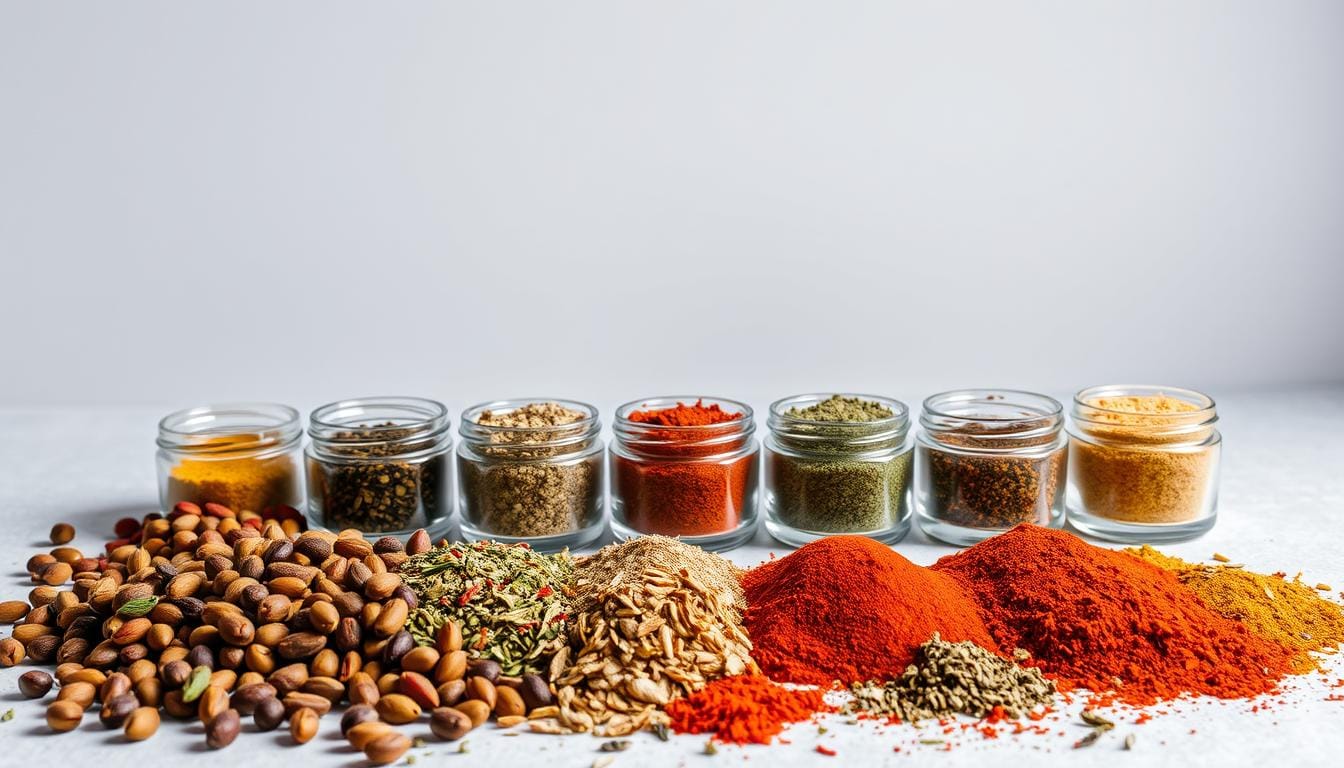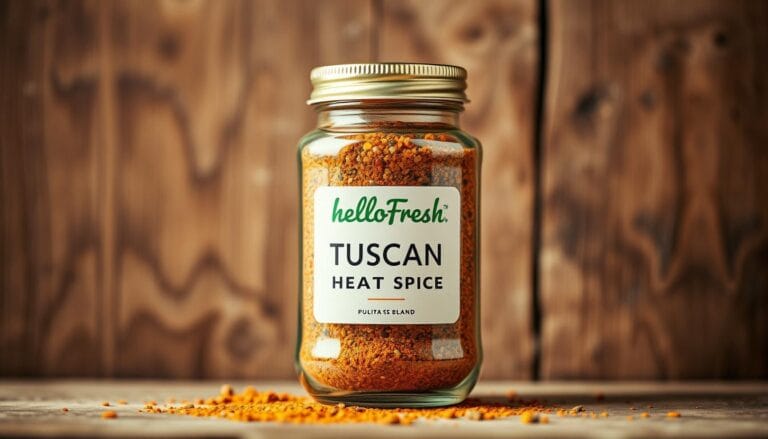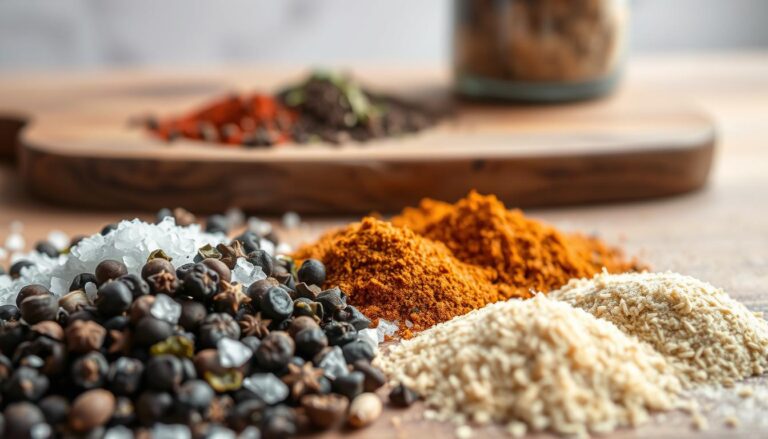Discover the Best Spices for Chicken Dishes You Need to Try
Ever wondered why some chicken dishes taste extraordinary while others fall flat? The secret lies in the seasoning. Using the right mix of ingredients, like the best spices for chicken, can transform a simple meal into a culinary masterpiece. Creating a versatile chicken seasoning blend at home is easier than you think. With pantry staples like salt, pepper, and the best spices for chicken, you can craft a mix that suits your taste. Quality ingredients make all the difference, ensuring every bite is packed with flavor.
This guide compiles expert recipes and tips to help you master the art of seasoning. From marinating techniques to storage advice, you’ll find everything you need to elevate your cooking. Dive in and discover how to make your chicken dishes unforgettable with the best spices for chicken!
Ultimately, the best spices for chicken are essential for creating meals that are truly delightful.
So, don’t hesitate—explore the best spices for chicken and take your cooking to the next level!
Cooking with the best spices for chicken is a sure way to impress your family and friends.
Incorporate the best spices for chicken into your weekly meal prep for guaranteed flavor.
Integrating the best spices for chicken allows for creativity and personal expression in your cooking.
Choose the best spices for chicken and elevate your cooking game to new heights.
Emphasize the importance of the best spices for chicken for an unforgettable culinary experience.
Whether grilling or roasting, using the best spices for chicken ensures your dishes are always top-notch.
With a focus on the best spices for chicken, you can impress even the most discerning food critics.
Remember, every great dish starts with the best spices for chicken, setting the foundation for flavorful meals.
When you master the use of the best spices for chicken, you’ll turn every meal into a feast.
For ultimate flavor, consider the best spices for chicken that pair well with your chosen cooking method.
The best spices for chicken not only enhance taste but also enrich the overall cooking process.
Using the best spices for chicken in your marinades can impart flavor from the inside out.
Don’t forget that the best spices for chicken can also assist in healthier cooking choices by reducing the need for excess fats.
The right balance of the best spices for chicken can create unforgettable flavors that resonate with your guests.
Make the best spices for chicken a staple in your kitchen and watch your culinary skills flourish.
When you cook with the best spices for chicken, you’re not just seasoning—you’re enhancing the overall dish.
By using the best spices for chicken, you can create a variety of dishes that cater to any palate.
Incorporate the best spices for chicken into various cooking methods for maximum flavor impact.
Consider experimenting with the best spices for chicken to discover unique flavor combinations.
With the best spices for chicken, you’ll find yourself creating dishes that are both delicious and memorable.
Emphasizing the best spices for chicken in your recipes can elevate your cooking to a new level.
Using the best spices for chicken is essential for creating mouthwatering meals that everyone will love.
The best spices for chicken can help ensure that your dishes are flavorful and enjoyable.
Don’t underestimate how the best spices for chicken can turn a good meal into an unforgettable one.
For vibrant and flavorful chicken, the best spices for chicken should be your go-to choice every time.
Remember, the best spices for chicken are not just about flavor but enhancing the overall dining experience.
By incorporating the best spices for chicken, you can explore various flavor profiles and truly personalize your dishes.
When cooking chicken, the best spices for chicken create a delicious and aromatic experience that is hard to resist.
To enhance your culinary experience, try using the best spices for chicken that not only elevate taste but also ensure your dishes are memorable.
Table of Contents
Key Takeaways
- Seasoning is the key to enhancing the flavor of chicken dishes.
- Homemade blends allow for customization and versatility.
- Quality ingredients like salt, pepper, and paprika are essential.
- Expert recipes and tips simplify the seasoning process.
- Proper marinating and storage techniques ensure maximum flavor.
Overview of Chicken Seasoning Benefits
When using the best spices for chicken, remember that balance is key—too much can overwhelm the dish’s natural flavors.
Using the best spices for chicken not only enhances taste but also ensures your dishes are memorable.
The right seasoning can turn a simple chicken meal into a flavor-packed experience. It’s not just about taste—seasoning enhances the aroma, appearance, and even the healthiness of your dish.
Whether you’re grilling, roasting, or frying, a well-seasoned piece of meat makes all the difference.
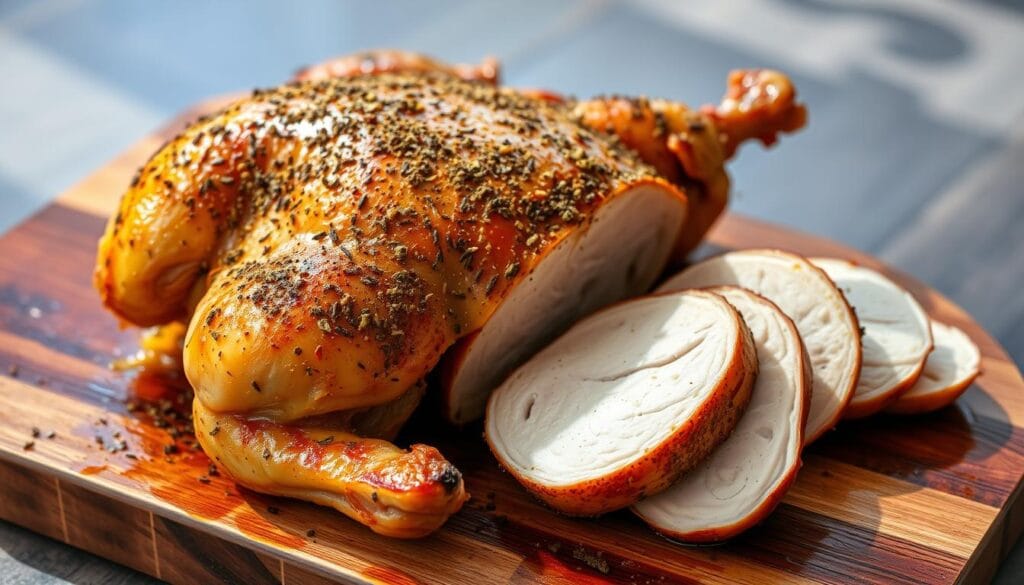
Understanding the best spices for chicken is essential for maximizing flavor and tenderness.
Exploring the best spices for chicken will help you craft perfectly seasoned dishes every time.
Using the best spices for chicken can help you achieve not only flavor but also health benefits in your meals.
Why Seasoning Matters
Seasoning does more than add flavor. It helps tenderize the meat, locking in moisture for a juicier result. A balanced blend of spice and herbs also improves browning, giving your dish a visually appealing golden crust. Even an extra minute of marinating can elevate the taste significantly.
Flavor and Health Benefits
Every cook should experiment with the best spices for chicken to discover their unique flavor preferences and enhance meal enjoyment.
The best spices for chicken are not just about taste; they also provide essential nutrients and antioxidants.
Using the right mix of ingredients, like pepper and paprika, enhances the natural flavors of chicken. It also allows you to control sodium levels, making your meals healthier. Seasoning can even reduce the need for added fats, promoting better cooking practices.
For optimal results, incorporate the best spices for chicken during marination or cooking to enhance their effectiveness.
| Benefit | Description |
|---|---|
| Flavor Enhancement | Unlocks deeper tastes and aromas. |
| Visual Appeal | Creates a golden, appetizing crust. |
| Healthier Cooking | Reduces sodium and added fats. |
| Moisture Retention | Keeps the meat tender and juicy. |
Understanding the Basics of Chicken Seasoning
Mastering the art of seasoning starts with understanding the basics. A well-balanced blend of spices can elevate your dish from ordinary to extraordinary. Whether you’re a beginner or a seasoned cook, knowing the essentials is key.

Essential Spices for Every Cook
Every kitchen should have a few fundamental spices on hand. Garlic powder, onion powder, and paprika are staples that add depth and complexity to your dishes.
These ingredients form the backbone of a versatile blend. Using the right amount is crucial. For example, a tablespoon of seasoning per pound of meat ensures consistent flavor. A proper rub helps distribute the seasoning evenly, enhancing every bite.
Common Seasoning Mistakes
Remember, using the best spices for chicken will make a noticeable difference in the overall flavor profile of your dishes.
One of the most common mistakes is over-seasoning. Too much salt can overpower the natural flavors of the meat. Another error is not letting the seasoning meld.
Giving it time to sit ensures the flavors penetrate deeply. Incorrect measurements can also ruin a dish. Using a tablespoon as a guide helps maintain balance. A well-crafted blend not only improves taste but also the texture of the meat.
“The key to great seasoning is balance. Too much or too little can throw off the entire dish.”
Understanding these basics will help you avoid pitfalls and create flavorful meals every time. With the right spices and techniques, you’ll master the art of seasoning in no time.
How to Use the Best Spices for Chicken
Transforming your chicken dishes starts with mastering the art of seasoning application. The way you apply your seasoning mix can significantly impact the final flavor.
Whether you’re grilling, roasting, or frying, these techniques ensure every bite is packed with deliciousness.
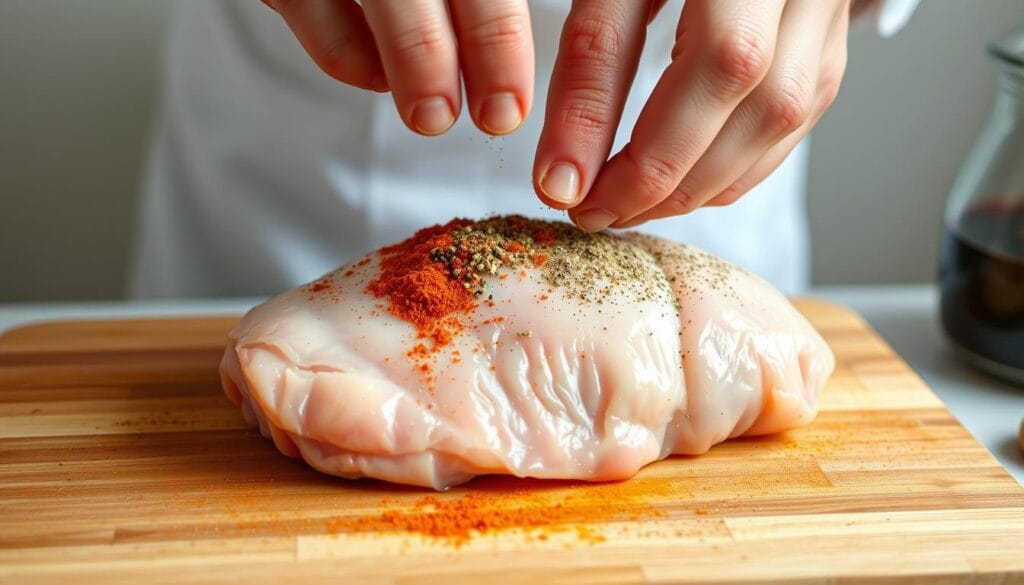
Step-by-Step Application Guide
Start by patting the chicken dry with a paper towel. A dry surface helps the seasoning adhere better, ensuring even coverage. Next, combine your ingredients in a small bowl.
This step ensures a uniform mix of flavors. Apply the seasoning generously, using your hands to rub it into the meat. The “rub” technique helps the flavors blend with the natural juices of the chicken.
Let the seasoned meat sit for at least 15 minutes before cooking. This allows the flavors to penetrate deeply.
Tips for Even Coating and Flavor Distribution
For consistent results, pre-mix your ingredients. This ensures every part of the chicken gets the same amount of seasoning. Use a blend of garlic powder, onion powder, and paprika for a balanced flavor profile.
When cooking, adjust the heat to prevent burning the seasoning. Low and slow methods like roasting or baking help retain moisture and flavor. For grilling, keep the chicken moist by basting it occasionally.
“The key to great seasoning is even distribution. Take your time to rub it in properly for maximum flavor.”
| Technique | Benefit |
|---|---|
| Patting Dry | Ensures better adhesion of the seasoning. |
| Pre-Mixing | Guarantees uniform flavor distribution. |
| Rub Technique | Helps flavors blend with the meat’s natural juices. |
| Resting Time | Allows flavors to penetrate deeply. |
By following these steps, you’ll achieve perfectly seasoned chicken every time. Experiment with different blends to find your favorite way to enhance the flavor of your dishes.
All-Purpose Chicken Seasoning Recipes
By focusing on the best spices for chicken, you’ll develop a better understanding of seasoning, which is essential for culinary success.
Creating a versatile seasoning mix at home is simpler than you might think. With just a few pantry staples, you can craft a blend that works for any dish. Homemade recipes allow you to control the ingredients and tailor the flavor to your liking.
To maximize flavor retention and freshness, store your best spices for chicken in airtight containers away from light.
Simple Dry Rub Mixture
Proper application of the best spices for chicken can result in juicy, flavorful dishes that are sure to satisfy.
Start with a basic dry rub recipe that’s easy to prepare. Combine 2 tablespoons of salt, 1 tablespoon of paprika, and 1 teaspoon of garlic powder. Add a pinch of black pepper for a subtle kick.
Mix these ingredients thoroughly in a small bowl. This blend is perfect for coating chicken before grilling or roasting. For best results, let the seasoned meat rest for at least 15 minutes. This allows the flavors to meld and penetrate the meat.
Customizing Your Spice Blend
Feel free to experiment with additional ingredients to suit your taste. Add a teaspoon of onion powder for extra depth or a dash of cayenne for heat. You can also include dried herbs like thyme or oregano for a fresh twist.
Store your custom blend in an airtight container to preserve its potency. Keep it in a cool, dry place to maintain freshness. Homemade seasoning ensures you know exactly what’s in your mix, unlike store-bought options.
“The beauty of homemade seasoning is its versatility. You can adjust the flavors to match your preferences and cooking style.”
By making your own chicken seasoning recipe, you save time and money while enjoying fresher, more flavorful meals. Experiment with different combinations to find your perfect blend.
Ultimately, the best spices for chicken are key for creating memorable meals that leave a lasting impression on your guests.
Seasoning Techniques by Cooking Method
Different cooking methods call for unique seasoning approaches to bring out the best in your chicken dishes. Whether you’re grilling, roasting, or air frying, adjusting your seasoning ensures maximum flavor and texture. Let’s explore how to tailor your techniques for each method.
Grilling and Roasting Tips
Grilling and roasting require a robust seasoning blend to withstand high heat. Start by patting the chicken dry to help the seasoning stick.
Use a mix of garlic powder, onion powder, and a pinch of cayenne pepper for a flavorful crust. For chicken breast, apply the seasoning generously and let it rest for at least 15 minutes.
This allows the flavors to penetrate the meat. When roasting, baste the chicken occasionally to keep it moist and enhance the seasoning’s impact.
Leveraging the best spices for chicken can transform simple recipes into culinary delights.
Frying, Sautéing, and Air Frying Methods
Maintaining the freshness of the best spices for chicken is key to maximizing their flavor and impact.
Frying and sautéing benefit from lighter seasoning to avoid overpowering the dish. A blend of garlic powder and onion powder works well, adding depth without overwhelming the natural flavors. For air frying, use a light coating of seasoning to ensure even cooking.
Chicken thighs, with their higher fat content, can handle bolder seasoning compared to breast. A pinch of cayenne pepper adds a subtle kick without being too spicy. Adjust the amount based on your preference and the cooking method.
The best spices for chicken can elevate even the simplest dish into a gourmet experience.
Utilizing the best spices for chicken and storing them properly will enhance your cooking experience.
| Cooking Method | Seasoning Tips |
|---|---|
| Grilling | Use robust blends with garlic powder and cayenne pepper. |
| Roasting | Baste occasionally to enhance flavor and moisture. |
| Frying | Opt for lighter seasoning to avoid overpowering the dish. |
| Air Frying | Apply a light coating for even cooking and crispiness. |
By adapting your seasoning techniques to the cooking method, you’ll achieve perfectly flavored chicken every time. Experiment with different blends to find what works best for your favorite dishes.
Storing Your Homemade Chicken Seasoning
Proper storage is the secret to maintaining the flavor of your spice blend. Whether you’re seasoning a juicy thigh or a tender breast, keeping your mix fresh ensures every dish tastes its best. Here’s how to store your homemade seasoning for maximum shelf life and flavor retention.
Always try to include the best spices for chicken in your everyday cooking for enhanced flavor and enjoyment.
Best Practices for Storage
Start by using a high-quality airtight container. This prevents moisture and air from degrading the ingredients. Store your spice blend in a cool, dark place like a pantry or cupboard. Exposure to light and heat can cause ingredients like paprika to lose their potency over time.
Certain herbs, such as oregano, are rich in vitamin content but can degrade quickly if not stored properly. Label your container with the date of preparation to track its shelf life. Most homemade blends stay fresh for 3 to 6 months when stored correctly.
Maintaining Freshness and Effectiveness
Shake your container before each use to redistribute the ingredients evenly. This ensures every sprinkle delivers a balanced flavor. If you notice a loss of aroma or color, it’s time to refresh your seasoning recipe.
“Proper storage isn’t just about longevity—it’s about preserving the vibrant flavors that make your dishes shine.”
By following these simple steps, you’ll keep your seasoning fresh and ready to enhance any dish, from grilled thighs to roasted breasts. A little care goes a long way in maintaining the quality of your homemade blends.
Enhancing Flavor with Complementary Ingredients
Elevating your chicken dishes goes beyond just seasoning—it’s about layering flavors with complementary ingredients. Fresh herbs, aromatics, and sweet or spicy enhancers can transform a simple dish into something extraordinary.
These additions not only enhance the taste but also bring depth and complexity to your meals.
Adding Fresh Herbs and Aromatics
Fresh herbs like basil, parsley, and cilantro add a burst of freshness to your seasoning mix. Aromatics such as garlic, ginger, and lemon zest brighten the flavor profile, balancing the richness of the meat.
These ingredients work together to create a harmonious blend that enhances the natural flavors of the chicken.
When using fresh herbs, chop them finely to release their essential oils. This ensures even distribution and maximum flavor. Aromatics like lemon zest can be added directly to your seasoning mix or used as a garnish for a finishing touch.
Incorporating Sweet and Spicy Enhancers
Sweeteners like brown sugar or honey can add a subtle caramelization effect during cooking. This creates a golden crust and enhances the overall taste.
For a spicy kick, consider adding cayenne pepper or chili powder. These ingredients add warmth and complexity without overpowering the dish.
Experiment with small amounts to find the perfect balance. A pinch of sugar can elevate the flavor, while a dash of spice can add excitement. Store your custom blend in an airtight container to maintain freshness and potency.
“The key to great seasoning is balance. Every added ingredient should enhance the flavor without overshadowing the natural taste of the chicken.”
| Ingredient | Effect |
|---|---|
| Fresh Herbs | Adds freshness and brightness. |
| Aromatics | Enhances depth and complexity. |
| Sweeteners | Creates caramelization and richness. |
| Spices | Adds warmth and excitement. |
By incorporating these complementary ingredients, you can create a personalized seasoning blend that suits your taste. Experiment with different combinations to find what works best for your favorite dishes. Remember, the goal is to enhance, not overpower, the natural flavor of the chicken.
Additional Chicken Seasoning Ideas from Top Recipes
Exploring global cuisines can inspire unique seasoning blends for your chicken dishes. From Mediterranean herbs to Mexican spices, the world offers endless flavor possibilities. With a simple bowl and a few pantry staples, you can create a homemade mix that reflects your favorite culinary traditions.
Variations Inspired by Global Cuisines
For a Mediterranean twist, combine oregano, thyme, and lemon zest in a bowl. This blend pairs perfectly with grilled chicken, adding a fresh, herbaceous flavor. If you prefer Mexican-inspired dishes, try a mix of chili powder, cumin, and smoked paprika.
This seasoning blend adds a smoky, spicy kick to your meals. Italian cuisine lovers can experiment with basil, rosemary, and garlic powder.
These herbs create a fragrant and savory mix that works well with roasted or baked chicken. For an Asian-inspired option, blend ginger, garlic, and a touch of soy sauce. This combination adds depth and umami to your dishes.
“The beauty of global seasoning blends is their versatility. You can customize them to suit your taste and cooking style.”
To make your homemade seasoning even more unique, consider adding a pinch of cinnamon or nutmeg for warmth. These subtle additions can elevate your dish without overpowering the main flavors. Store your custom blends in an airtight container to maintain freshness.
For more inspiration, check out these affiliate link resources. They offer expert tips and additional recipes to help you master global seasoning techniques. Whether you’re a beginner or a seasoned cook, these ideas will take your chicken dishes to the next level.
- Mediterranean: Oregano, thyme, lemon zest
- Mexican: Chili powder, cumin, smoked paprika
- Italian: Basil, rosemary, garlic powder
- Asian: Ginger, garlic, soy sauce
By experimenting with these global variations, you’ll discover new ways to enhance your chicken dishes. A simple bowl and a few ingredients are all you need to create a homemade seasoning blend that reflects your culinary creativity.
Conclusion
Crafting the perfect seasoning blend is both an art and a science. Using high-quality, homemade mixes ensures your dishes are packed with flavor. The versatility of these blends makes them suitable for grilling, roasting, or frying, adapting to any cooking method with ease.
Experiment with different ingredients to find what works best for your taste. Whether you prefer a hint of heat or the earthy aroma of freshly groundoregano, the possibilities are endless. A small bowl is all you need to mix your custom blend and elevate your meals.
We’d love to hear about your seasoning adventures! Leave a comment or share your creations on social media. Your feedback helps us all learn and grow in the kitchen. Remember, it’s the small details that make a big difference in flavor.

